As many as 1 out of every 10 people in the US and other western countries will experience a stomach ulcer at some point in their lives. (1)
These irritating and often painful sores in the esophagus, stomach, and small intestine can be easy to treat, but if not addressed, can cause serious health problems.
The stomach and small intestine have protective mucus that lines them and keeps them safe from erosion from the very acid we need for healthy digestion. Ulcers happen when something weakens or alters this mucus coating, and the tissues become damaged from exposure to acid.
Are you struggling to lose weight, craving foods you shouldn’t, and finding yourself fatigued and unable to focus? Chances are, your Hormones are out of whack.
Get our FREE Guide to fixing your Hormones through the Paleo diet here!
H. Pylori: What It Is and How It Contributes to Ulcers
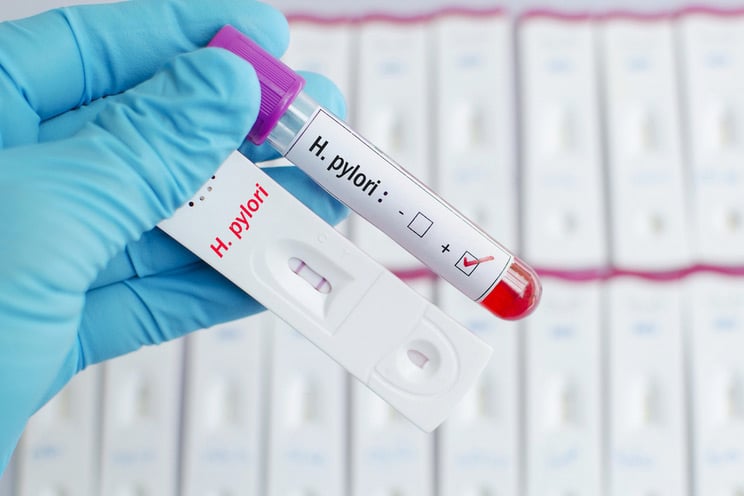
While there are a handful of common causes for ulcers, including overuse of NSAID pain relievers and frequent smoking or alcohol use, there is a bacteria that can frequently be blamed for triggering the damage to the protective mucus of the digestive tract. (2,3)
This bacteria is referred to as H. pylori, short for helicobacter pylori. It is a spiral-shaped bacteria that attacks the mucus of the stomach and upper small intestine. The resulting damage leads to holes in the coating that are vulnerable to irritation from the bacteria itself as well as the searing digestive acid.
There’s no definitive understanding as to how H. pylori is contracted, but it is a common bacteria that can be present in the digestive tract. It’s thought to spread through saliva contact or through food and water.
The problem with stomach ulcers caused from this bacteria is that they don’t always produce symptoms. As many as 75 percent of people with ulcers won’t have symptoms. (4)
On their own, stress and spicy foods won’t cause ulcers, but when H. pylori is present, these factors can aggravate the condition and lead to the formation of an ulcer.
Bottom line: H. pylori is a bacteria that attacks the mucus of the stomach and upper small intestine, contributing to and causing ulcers. While it can often go undetected, it can be aggravated by outside factors such as stress and spicy food.
11 Signs You May Have a Stomach Ulcer
Symptoms of stomach ulcers can be varied, and attributed to other things, making them difficult to identify without medical help. Some ulcers also produce no symptoms at all, or only after they have perforated the stomach wall and become a serious medical problem. Lightheadedness, vomiting blood, or having black or tarry stools – all signs of internal bleeding, potentially due to an ulcer – should be treated immediately by a medical professional.
Common earlier symptoms of ulcers can include: (5,6,7)
- Indigestion or frequent heartburn
- Stomach pain
- Burning or dull pain in the stomach, sometimes described as biting or stabbing
- Frequently feeling hungry or improved stomach pain when food enters the stomach
- Weight loss that is unexpected
- Nausea
- Vomiting
- Lack of appetite
- Constant burping
- Bloating
- Frequent need or desire to take antacids
Symptoms of stomach ulcers can also change over time, or in severity.
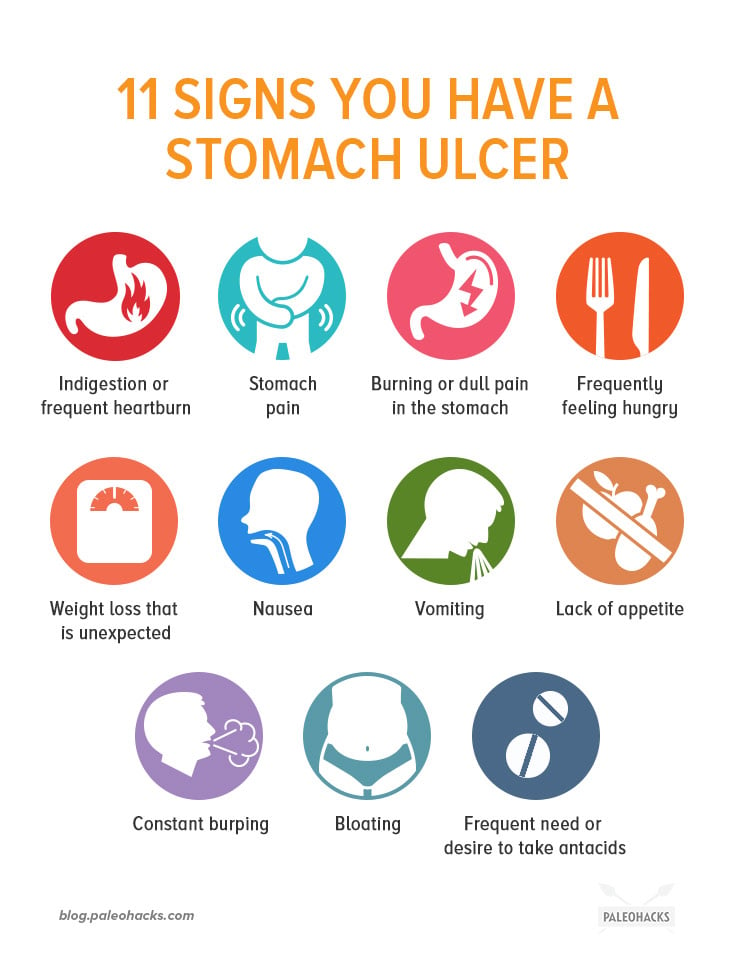
Bottom line: Figuring out that you have an ulcer based on symptoms alone can be difficult, but regardless, a proper diagnosis requires a medical professional. If you have risk factors, are excessively stressed, or have digestive issues, it’s probably time to investigate more.
The Dangers of Stomach Ulcers
While ulcers don’t necessarily cause more than discomfort initially, if left untreated, they can lead to some serious medical complications. These can include: (8,9)
- Internal bleeding and serious blood loss which can require hospitalization and blood transfusions
- Anemia
- Bloody vomit
- Black or tarry stools
- Peritonitis, or infection of the abdominal cavity
- Obstructed digestion
- Trouble breathing
At the first sign or symptom of ulcers, it’s important to get a medical evaluation and to treat them appropriately to prevent a worsening or severe condition.
Ulcers can be easy to treat and manage, even naturally, once they are diagnosed.
Traditional treatment for stomach ulcers involves removing sources of aggravation, like:
- Switching away from NSAID or steroid drugs which could be worsening the condition
- Quitting cigarettes
- Eliminating alcohol consumption
- Taking acid blocking drugs to reduce and manage stomach acid
When an ulcer is caused by H. pylori, it’s important to live a lifestyle that reduces aggravation and the causes, because ulcers can easily return if the bacteria continues to live in the digestive tract.
Sometimes conventional medical treatment will require surgery to address ulcer complications, especially if they’ve begun to bleed internally. Surgical intervention typically involves the removal of the ulcer, tying off bleeding vessels, grafting tissue from another site to repair the ulcer, or reducing the stomach’s ability to produce acid.
Bottom line: Ulcers aren’t always a medical emergency, but when left unaddressed, they can cause serious problems. Getting professional medical help at the first sign of serious symptoms is vital. Ulcer complications can be prevented by addressing them when less severe symptoms begin to appear.
How to Have a Healthy Stomach
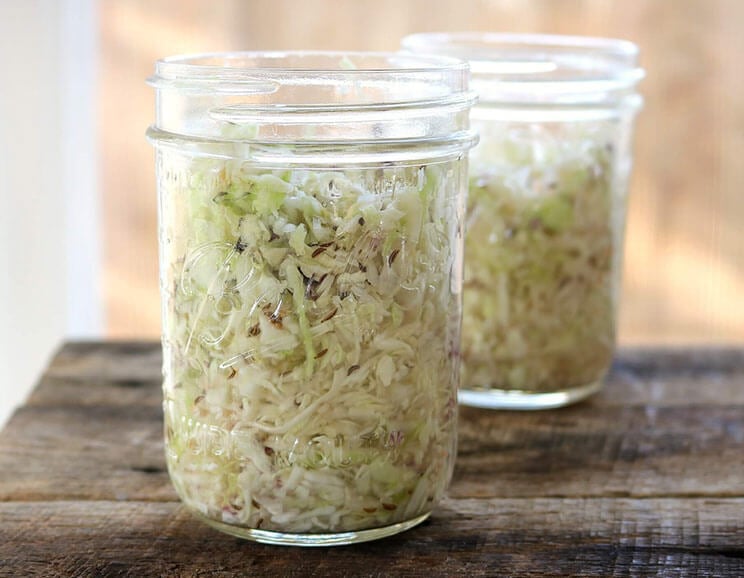
Whether you’re prone to ulcers, or you’ve never had one before and want to avoid it at all costs, preventing them starts with making sure digestion is optimized. Even if you get H. pylori, a healthy bacterial balance in the stomach and elsewhere in the digestive tract can help to keep it in balance and even eradicate it.
H. pylori affects as much as half of the world’s population, so the chances of having it or getting it at some point are pretty high. (10) Having reduced inflammation in the body as well as eating plenty of certain types of foods, can reduce the chance of H. pylori creating negative health problems, including ulcers.
1. Eat smaller meals
While we tend to go through life with a three-meals-a-day type of approach, this can actually be burdensome for most people’s digestion, especially when digestion isn’t working as it should. Consuming foods in smaller quantities, and more frequently, can improve enzymes and gastric function overall. (12)
2. Eat fermented foods
The good bacteria found in fermented foods can help keep H. pylori in check, so regularly eating these foods can be an excellent prevention plan. Since this bacteria doesn’t live forever in the gut, it regularly needs to be replenished. Hint: Bad bacteria can live longer, which is why regular intake of good bacteria is essential for beating the bad guys. Fermented foods like sauerkraut, kimchi, and kombucha are all Paleo-friendly dishes that you can make at home.
3. Load up on fiber
Even with a Paleo diet, people can tend to fall short on fiber. It’s important to remember that Paleo isn’t meat and meat only, but should include primarily fresh fruits and vegetables, all of which are rich in fiber. Not only does this improve digestive function, but it also provides the body with needed nutrients to fight off infection, including those caused by H. pylori and other harmful bacteria. If you haven’t been keeping track of fiber intake, now is the time to start. Aim for 20-40 grams of quality fiber daily.
Bottom line: Boosting digestive function is essential for being a healthy human, not just for avoiding ulcers. These three simple dietary changes can make a huge difference in how your body digests food, as well as how bacteria function within it.
15 Foods to Avoid If You Have a Stomach Ulcer
There are some mixed opinions on which foods are bad for stomach ulcers, but most agree on the following as foods that will aggravate existing ulcers: (13,14,15,16,17)
- Black pepper
- Hot peppers
- Caffeine
- Coffee
- Alcohol
- Tea
- Chocolate and cocoa
- Carbonated beverages
- Refined sugar and most sweeteners
- Citrus fruit and juice
- Fried foods
- Tomatoes
- Peppermint
- Omega-6 fats (nuts, seeds, etc.)
- Milk and dairy products
Beyond just avoiding these foods, it’s important to follow good practices for improving digestion, like eating smaller meals and chewing food thoroughly. In most cases this means chewing the food for twice as long as you naturally do. This alone can improve digestive function and reduce stomach irritation. [tweet_quote]Another way to increase digestive function is to eat slowly and without stress.[/tweet_quote]
Another way to increase digestive function is to eat slowly and without stress. Too many people rush through meals, they don’t inhale their food, and don’t take the time to breathe away the stress of the day. While these things seem unrelated to ulcers, it’s well documented that stress can worsen ulcers, even though it can’t cause them on its own. (18)
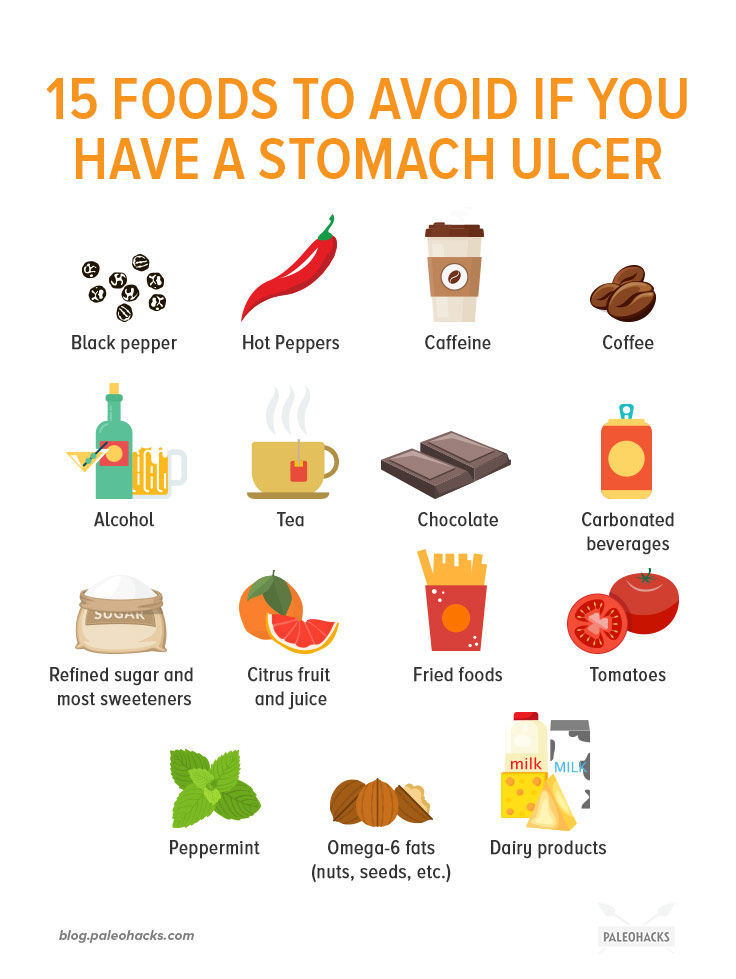
Bottom line: Avoiding aggravating foods is an important part of healing, but lifestyle changes – such as eating smaller meals and reducing stress – can also have a positive effect on digestive health and ulcer prevention.
4 Healing Foods to Eat When You Have an Ulcer
Avoiding triggering foods is step one. Next, you also need to consume foods that will help the stomach and digestive system to heal from the ulcer, while fighting off the bad bacteria that can bring them on.
Ulcer-healing foods are rich in vitamins and minerals and other nutrients to help the stomach repair and to naturally boost digestion.
Nutrients that are vital in the healing process include vitamin A, zinc, selenium, and vitamin C, along with fiber and probiotics. (19)
1. Cruciferous Vegetables
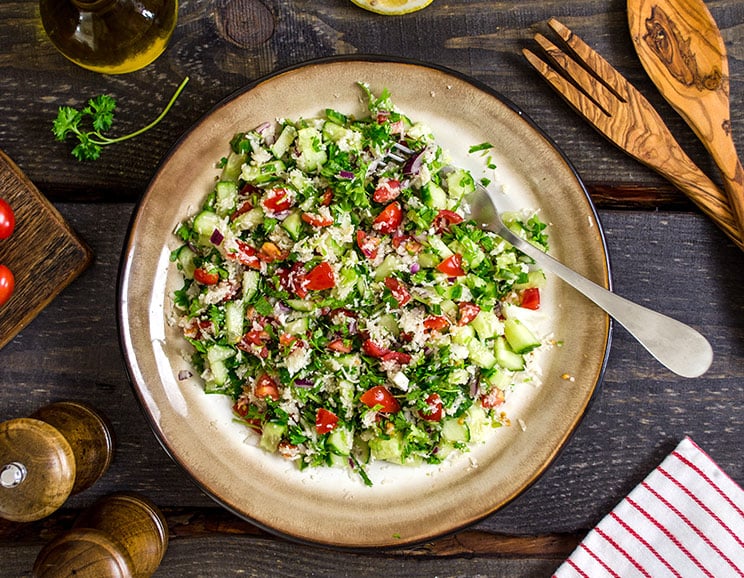
These detox-friendly cruciferous veggies are great for naturally combating H. pylori. (20) Whether you eat them raw, steamed, or roasted, their presence can help to suppress overproduction of H. pylori, as well as support the liver in its ability to detox harmful substances from the body. They’re also a loaded source of fiber. Eat two to three servings daily of the following:
- Cauliflower
- Cabbage
- Radishes
- Broccoli
- Brussels sprouts
Cabbage juice is also therapeutic for ulcer healing as well as prevention. (21,22) While it’s an age-old natural remedy, it is still effective today, thanks to the hefty dose of vitamin C that a single serving of juiced cabbage provides. (23,24) One study showed that peptic ulcers could heal in just 10 days or less when cabbage juice was used, which is significantly faster than the estimated six to eight weeks with conventional treatment. (25)
2. Turmeric

Turmeric is popular for all kinds of reasons, and ulcer-healing can be added to the list. Curcumin, the active ingredient in turmeric that has wide-ranging medicinal properties, can reduce inflammation throughout the body. (26) It can also prevent damage from H. pylori infections and protect the stomach against irritants that attack the lining and decrease mucus production. (27)
While more studies are needed to further confirm turmeric’s healing potential for ulcers, the ones that have been done show that 500 t0 600 mg of turmeric daily can dramatically increase ulcer healing, eradicating most in four weeks or less. (28,29)
3. Raw Honey
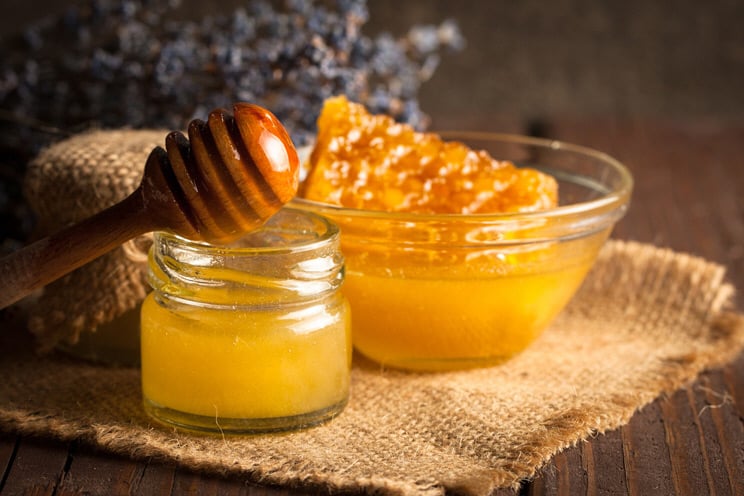
While refined sugars and most sweeteners should be avoided for ulcer healing, raw honey has unique benefits. It is rich in antioxidants, which can help to counter the inflammatory effects of both ulcers and H. pylori, and it can even help to prevent wounds from forming in the first place. (30)
Raw honey also possesses antibacterial properties that fight H. pylori and other negative effects of bad bacteria within the body. (31,32,33) Just make sure that the honey you choose is high quality, raw and organic – not filled with artificial sugars and preservatives – to get the full benefits.
4. Garlic

Garlic is another food well-reputed for its antibacterial and healing properties. It’s beneficial for ulcers because it can combat H. pylori and prevent ulcers from developing, as well as speed ulcer healing time. (34,35,36,37)
Garlic is most potent when it’s consumed raw, which is typically not the most appealing way to eat it. Still, a recent study showed that eating two raw garlic cloves per day for three days reduced H. pylori bacterial activity in the stomach. (38)
Garlic has benefits even when not raw, so add it to roasted dishes, soups, stews, and vegetables for maximum effect. Fresh minced or chopped garlic is more potent than prepared or stored spice versions.
3 Proven Natural Ulcer Remedies
Beyond dietary interventions, there are three natural remedies that can be added to dietary changes to boost ulcer healing and prevention efforts. A healthy lifestyle that focuses on reduced stress, plenty of sleep, and proper hydration are also key elements.
1. Licorice Root
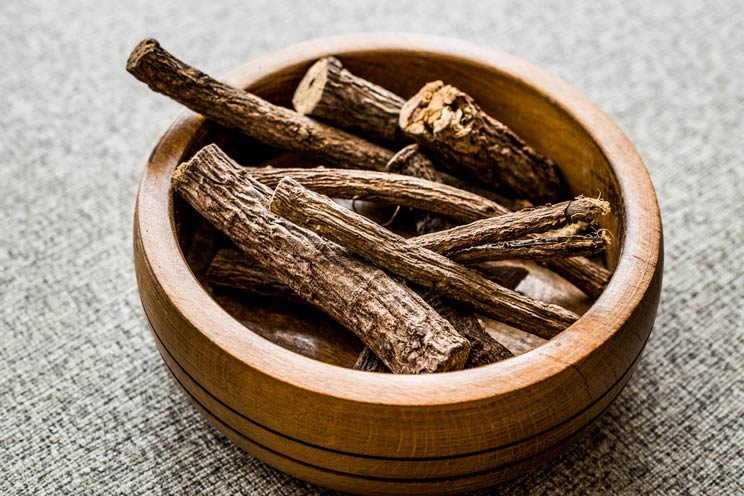
Deglycyrrhizinated licorice, also known as DGL, has soothing and restorative properties for the digestive tract and it can also help to protect the mucosal lining of the stomach and upper small intestine, where ulcers tend to form. It can also inhibit the activity of H. pylori. (39,40)
Licorice can also stimulate the stomach to produce more protective mucus after it has been hampered by bacterial problems, which can lead to faster ulcer healing and reduced chance of recurrence. (41)
Take licorice root before meals twice a day, typically in 500 mg servings. Because it can interact with some medications, it’s best to consult your doctor before adding licorice to your ulcer healing plan.
2. Aloe Vera

Popular as a sunburn remedy, aloe vera can also help to reduce inflammation and irritation on tissues inside of the body. Aloe can help to heal damage of the intestinal lining, including ulcer damage, and can work to prevent damage from H. pylori. (42,43)
One study showed that aloe vera was equally as effective as prescription based medication for healing ulcers, and other research shows that it can help reduce damaging stomach acid, giving the lining time to heal. (44,45)
While aloe is considered to generally be safe, in some people it can produce diarrhea or other gastrointestinal symptoms. Recommended doses range from ¼ cup once per to day ¼ cup three times per day, between meals.
3. Probiotics

While probiotics from food sources are great, it can be helpful to boost intake with the use of probiotic supplements during the healing process and for maintenance afterward.
Good bacteria found in probiotics can help keep bacterial balance in the body, and can reduce the effects of H. pylori by suppressing its activity. (46)
Probiotics can speed ulcer healing time by helping to promote the formation of new blood vessels, which speeds transport of healing nutrients and cells to the site of the ulcer injury. (47)
While there is no research-proven dose of probiotics, experts recommend a range of 200 million to 100 billion colony forming units (CFUs) daily. (48) While they may only be required for four to six weeks for healing, they can be taken daily long-term to help prevent recurrences and to support good gut health.
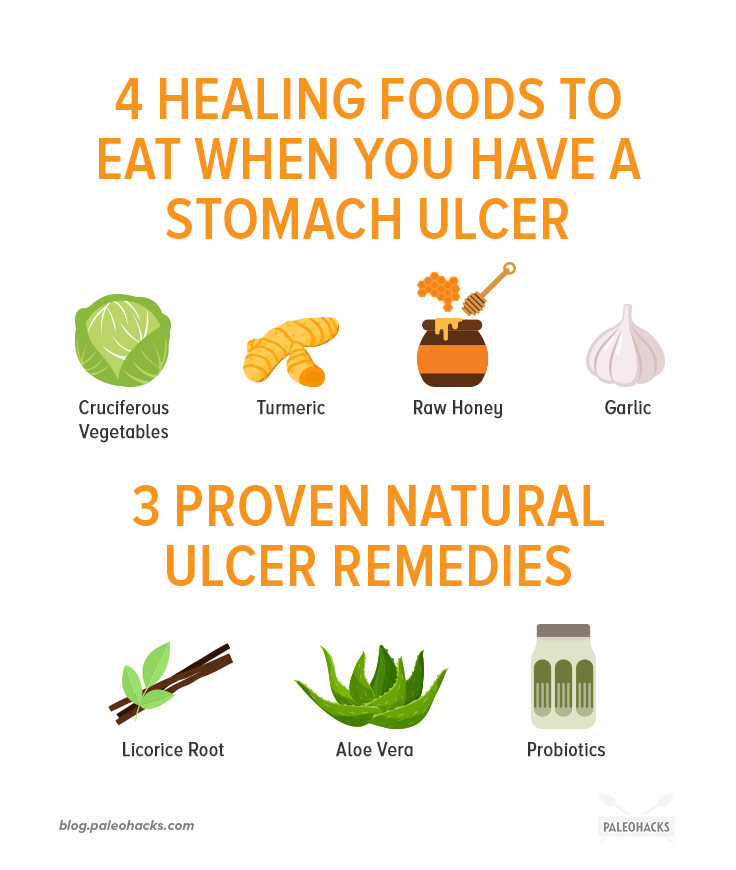
(Read This Next: How To Tell If You Have Fibroids and 7 Natural Remedies)



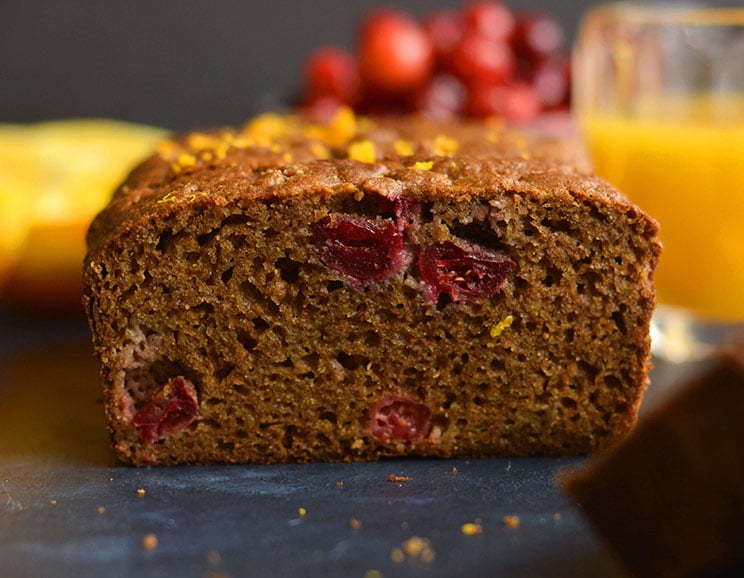 This Cranberry Orange Bread Is Deliciously Grain-Free
This Cranberry Orange Bread Is Deliciously Grain-Free





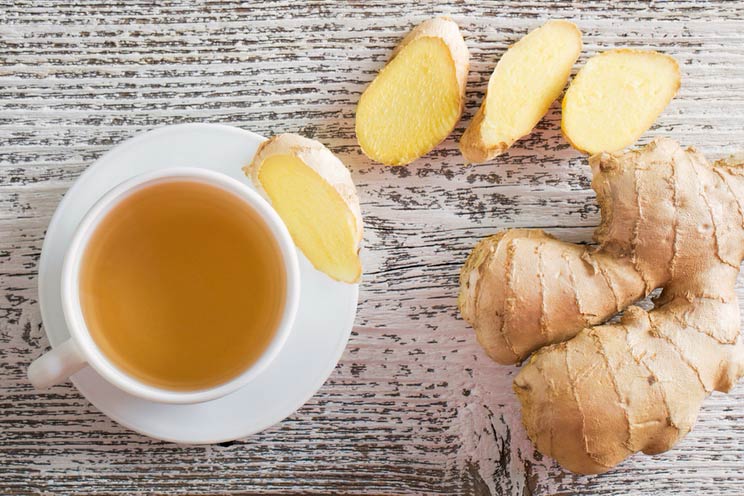
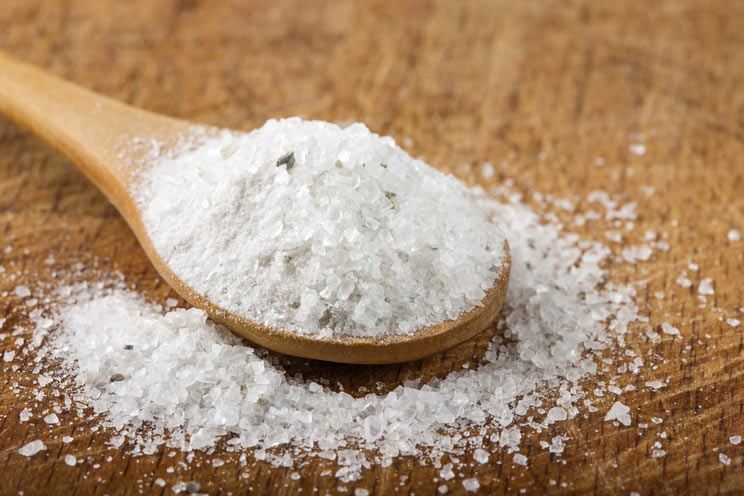


Show Comments